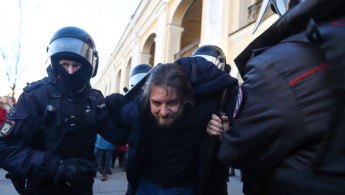Russian speaker proposes stripping 'traitors' of citizenship
The speaker of Russia's lower house of parliament demanded Monday that "traitors" opposed to Moscow's Ukraine offensive lose their citizenship, giving the example of the journalist who brandished an anti-intervention placard on TV.
"The vast majority of our citizens support the special military operation in Ukraine, they understand its need for the security of our country and our nation. But there are also those who behave with cowardice, with treachery," said Duma speaker Vyacheslav Volodin.
"Unfortunately, for such 'citizens of the Russian Federation', there is no procedure for revoking citizenship and preventing them from entering our country. But maybe that would be good," he said on his Telegram channel.
"What do you think?" he asked his followers.
To illustrate his point, Volodin cited the case of journalist Marina Ovsyannikova, who shot to fame in mid-March by holding up a sign saying "No to war" live on television.
Ovsiannikova, who left her job with the Russian public television channel Pervy Kanal, has become a correspondent in Ukraine and Russia for the German daily Die Welt.
"Now she will work for a NATO country, justify arms deliveries to Ukrainian neo-Nazis, send foreign mercenaries to fight our soldiers and defend sanctions against Russia," Volodin said.
A radical measure such as stripping citizenship is unlikely to take effect without President Vladimir Putin's approval.
But Volodin's statements illustrate the increasingly hostile climate in Russia against any voice that is against Moscow's military offensive in Ukraine, under way since February 24.
The Kremlin has stepped up its crackdown in recent weeks, arresting thousands of protesters, blocking independent media and social networks.
Opponents of the military intervention have been constantly demonised and critics have seen the doors of their homes smeared with threatening messages.





 Follow the Middle East's top stories in English at The New Arab on Google News
Follow the Middle East's top stories in English at The New Arab on Google News
![Netanyahu furiously denounced the ICC [Getty]](/sites/default/files/styles/image_330x185/public/2024-11/GettyImages-2169352575.jpg?h=199d8c1f&itok=-vRiruf5)
![Both Hamas and the Palestinian Authority welcomed the ICC arrest warrants [Getty]](/sites/default/files/styles/image_330x185/public/2024-11/GettyImages-2178351173.jpg?h=199d8c1f&itok=TV858iVg)
